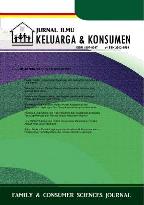PERAN GENDER, PENGAMBILAN KEPUTUSAN, DAN KESEJAHTERAAN KELUARGA DUAL EARNER
Abstract
Poverty can occur due to increasing of economic demands that affect the level of family well-being. It encourages wives to work in the public sector. Family well-being could be influenced by husband and wife cooperation regarding gender roles and decision making. This study aimed to analyze the gender role, decision making, and well-being of dual-earner families who were the wives had micro-enterprises and lived in Jakarta. This study used cross-sectional design and involved 62 families who are selected purposively. The participants were intact families who were the wives had micro-enterprises and the husband worked in formal or informal sectors. Data was collected by an interview using questionnaire. Data were analyzed by descriptive statistic, Pearson correlation, and multiple linear regression. The results showed that the average scores of the overall gender role and decision making in the dominant category on one subject (husband or wife only). The family subjective and objective well-being was generally in the high category. The husband's age and gender roles were positively and significantly related to the family subjective well-being, then family subjective well-being was positively and significantly related to the family objective well-being. Moreover, family subjective well-being was significantly positive influenced by domestic domain dimension of gender roles and family income.Copyright (c) 2018 Jurnal Ilmu Keluarga & Konsumen

This work is licensed under a Creative Commons Attribution-ShareAlike 4.0 International License.
Authors submitting manuscripts should understand and agree that copyright of manuscripts published are held Jurnal Ilmu Keluarga dan Konsumen. The statement to release the copyright to Jurnal Ilmu Keluarga dan Konsumen is stated in Copyright Release Form. Copyright encompass exclusive rights to reproduce, to distribute, and to sell any part of the journal articles in all form and media. The reproduction of any part of this journal is allowed with a written permission from Jurnal Ilmu Keluarga dan Konsumen.









